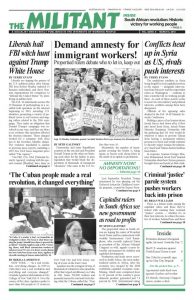Below is an excerpt from a speech given in 1985 by Jack Barnes, national secretary of the Socialist Workers Party, titled, “The Coming Revolution in South Africa.” It’s published in New International magazine no. 5. Copyright © 1985 by New International. Reprinted by permission.
What is the historic character of the revolution in South Africa?
It is a revolution to overthrow the apartheid state and tear apart the apartheid system.
It is a revolution to open the door to forging, for the first time, a nonracial South African nation-state.
This new nation will incorporate the African people from various tribal backgrounds, the descendants of those who lived there and worked the land before the white colonizers arrived, and who are the vast majority of the population of South Africa today. It will incorporate those the apartheid system classifies as Coloureds and Indians, who, together with the Africans, constitute the oppressed Black population. And it will incorporate those whites who will accept living and working as citizens with equal rights — no more, no less — in a democratic South Africa.
It is a revolution to conquer the right of the Black majority to own, work, and develop the land from which they have been expelled by the apartheid regime. To win the right of Africans to become free farmers, producing cash crops for an expanding home market. To carry out a real Homestead Act, opening the land to those who want to work it.
It is a revolution to abolish all restrictions on the rights of Black South Africans to live, labor, and travel where they choose. To establish full equality in the job market. To guarantee full trade union and labor rights.
It is a revolution aimed at replacing the state of the white minority with a democratic republic based on one person, one vote. Its goal — in the words used by the African National Congress — is a single, united, nonracial, and democratic South Africa.
It is a revolution in which the toilers are seeking to replace minority apartheid rule with rule by the working people, the great majority. They will then use that new revolutionary power to ensure that not a single brick of the apartheid system is left intact and that the democratic program of the revolution is put into practice.
From the historical standpoint, the South African revolution today is a bourgeois-democratic revolution for these goals. It is a democratic revolution, a national revolution. The working people are striving to lead it to victory and to create for the first time a true South African nation-state.
The South African revolution today is not an anticapitalist revolution. It will open the road to the transition to an anticapitalist revolution, but no one can predict how long, or short, that road will be. That will be determined by the relationship of class forces in South Africa and internationally that will emerge from the revolutionary overthrow of the apartheid state.

